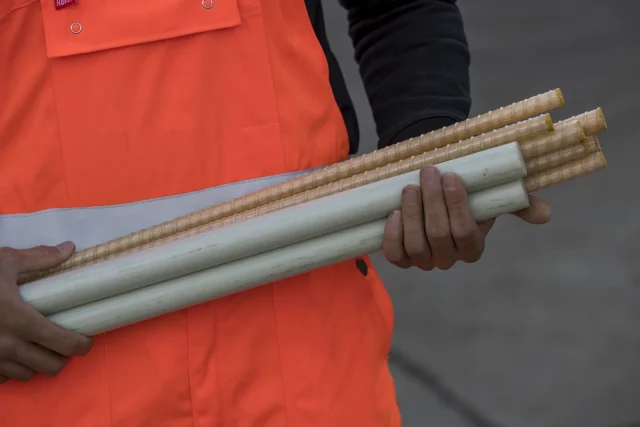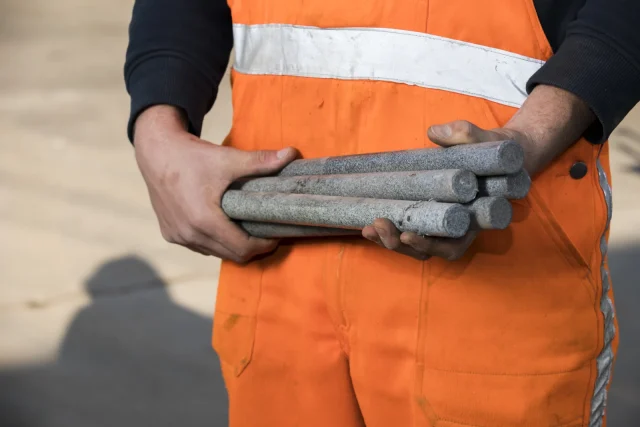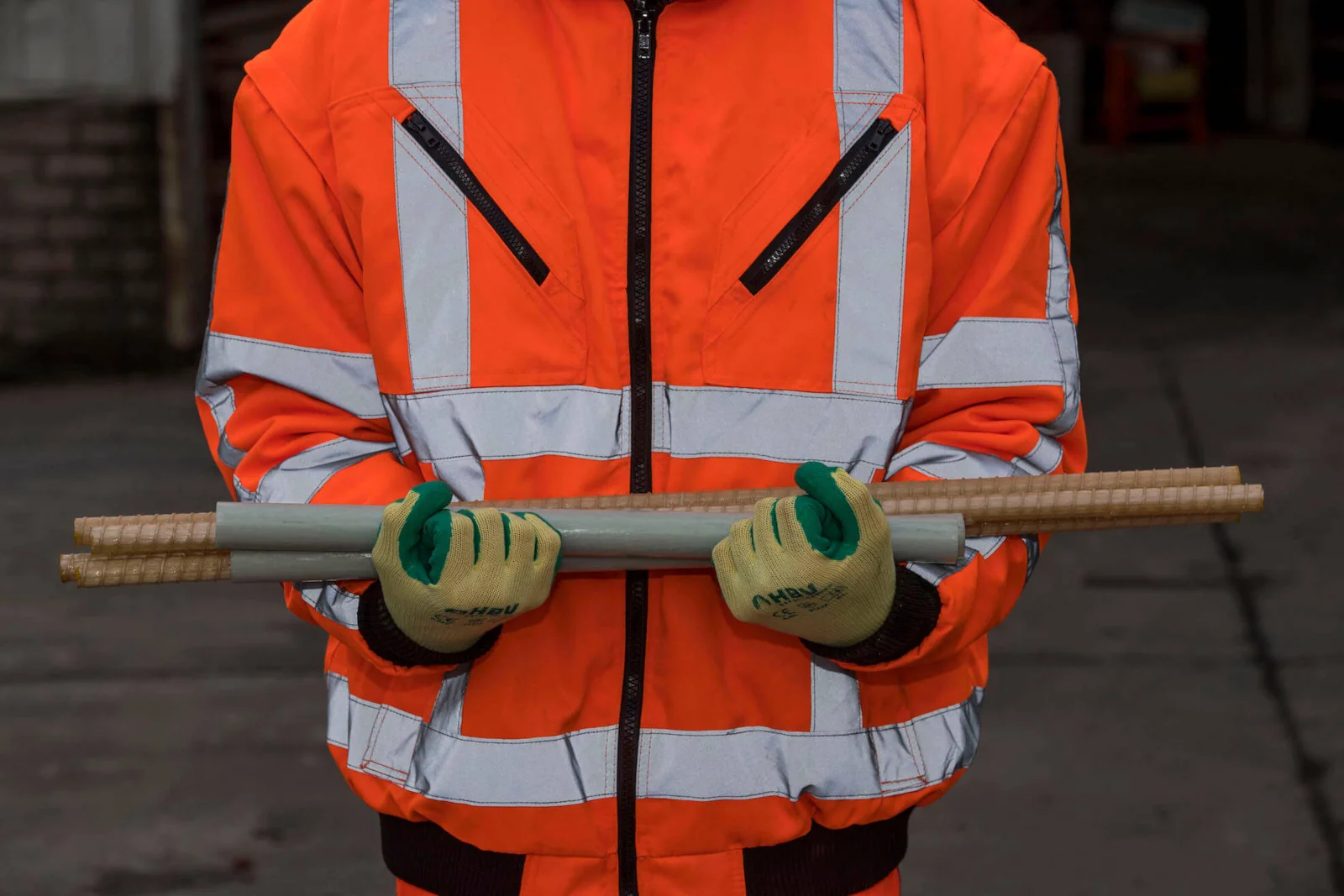We often encounter this question from buyers considering fiberglass as an alternative to traditional materials, particularly steel.
Steel is widely used in construction due to its high tensile strength, which can reach nearly 60,000 psi. However, in terms of strength-to-weight ratio, fiberglass significantly outperforms steel. Fiberglass offers the same strength as steel but is more flexible, making it impact-resistant. Moreover, fiberglass weighs only 25 percent of what steel does while maintaining equivalent strength. Additionally, fiberglass is stronger than steel in the lengthwise direction, making it ideal for load-bearing applications such as loading ramps.
For that reason a lot of industries are asking for fiberglass, because it is stronger and lighter than steel. Moreover, steel has some other disadvantages which makes fiberglass an even better alternative.
How strong is fiberglass compared to steel?
How strong is fiberglass compared to steel? Fiberglass is even stronger as steel. This means that when you have a steel reinforcement bar, of 25mm diameter for example. It would not be necessary to replace the steel reinforcement bar for a thicker <25mm reinforcement bar made of fiberglass. In some cases you even can reduce the thickness in comparison with steel bars.

Fiberglass
| Diameter tolerance | 0,3 mm +/- |
| Density | 2000 kg/m3 |
| Fiber volume content | 70% fibers |
| Tensile strength | 1000 Mpa |
| E-modulus | 54 Gpa |
| corrosion resistant | Yes |
| Weight | 400 gr |
| Higher tensile strength | 600 – 1600 N/mm2 |
| Chloride and phosphate resistant | Yes |
| Guidance radio waves | No |
| Thermal conductivity | 0,25% |
| Diagmagnetic | Yes |
| Sustainability | Full cradle to cradle |

Steel
| Diameter tolerance | 0,5 mm +/- |
| Density | 7800 kg/m3 |
| Fiber volume content | 99% steel |
| Tensile strength | 250 Mpa |
| E-modulus | 210 Gpa |
| corrosion resistant | No |
| Weight | 1200 gr |
| Higher tensile strength | 200 – 550 N/mm2 |
| Chloride and phosphate resistant | No |
| Guidance radio waves | Yes |
| Thermal conductivity | 48% tot 58% |
| Diagmagnetic | No |
| Sustainability | Full cradle to cradle |
The drawbacks of steel
Although steel has played a significant role in construction and manufacturing for a long time, it is not without drawbacks.
Susceptible to Corrosion
Steel is known to corrode, especially in corrosive environments. Even stainless steel is vulnerable to rust and corrosion when exposed to various reactive chemicals and moisture. Sulfuric acid, for instance, can quickly corrode steel, posing a significant risk to structural integrity in situations with a lot of repetitive dynamic loads. Corroded steel loses its load-bearing capacity and durability, potentially leading to dangerous situations like concrete ruptures in highways or other concrete pavements.
High Cost
The steel price fluctuates a lot. At this moment the steel price is equal in comparison to fiberglass. But from 2021 steel prices majorly have been more expensive than fiberglass. Especially when looking at the operational expenses and maintenance costs that come together with steel. In recent projects we have discovered that we can save up to 40% of the operational costs by replacing steel with fiberglass reinforcement. Especially if you are using our fiber dowels baskets.
Communication Disruptions
Steel is electromagnetic which can cause Electromagnetic Interference (EMI). EMI is an unwanted noise or interference in an electrical path or circuit caused from the outside. With other words, this is radio frequency interference. Steel reinforcement can cause electronics to operate poorly, malfunction or stop working completely. Which is of course not ideal when you are working at an airport, dock, container terminal, etc.
The benefits of fiberglass
Fiberglass emerges as a convincing and worthy alternative to steel, with several advantages.
Environmentally friendly
Fiberglass is known for its environmental friendliness; it requires less energy to produce and is recyclable, contributing to a lower environmental impact.
Not electromagnetic
Fiberglass is a non-electromagnetic raw material, which means that it doesn’t interfere with electrical paths of circuits. This guarantees that there is no interference with radio frequencies or third party equipment used after in the implementation of the fiberglass reinforcement. Perfectly suitable for airports, docks, container terminals, etc.
4x higher tensile strength
Fiberglass has a tensile strength up to four times higher than that of steel, providing exceptional durability and resistance to stretching or breaking under tension.
Corrosion resistant
Unlike steel, fiberglass is designed for long-term durability and is resistant to corrosion, making it ideal for use in harsh conditions where water and/or salt is involved.
4x lighter
Fiberglass is significantly lighter than steel, four times lighter even, reducing transportation costs and facilitating easier handling and installation.
Lower labor intensity and increased productivity with Fiber Dowels products
Due to the lightweight nature of our fiberglass products, labor intensity is drastically reduced. An employee can carry approximately 10 dowel baskets including dowels. This also increases productivity as projects can be completed much more efficiently and therefore faster.
A fun fact
Did you know that with Fiber Dowels fiberglass products, employees were able to place 40% more dowel baskets in 1 day than if they had used the steel version?
FAQ
Fiberglass, known for its lightweight properties, does not compromise on strength. In fact, fiberglass boasts a tensile strength up to four times higher than that of steel. This impressive strength ensures that fiberglass reinforcement is exceptionally durable and resistant to stretching or breaking under tension. Consequently, fiberglass is a highly reliable material for reinforcement, offering significant benefits in terms of risk management.
Steel and fiberglass are very different in their composition. Due to the lower density of fiberglass, the fiberglass is a lighter raw material. However the tensile strength of fiberglass is 4 times as high as the tensile strength of steel. Which makes fiberglass lighter and stronger. Furthermore, fiberglass offers unique advantages in terms of resistance against corrosion, non-electromagnetic, low thermal conductivity, etc
From 2021 onwards, fiberglass majorly has been cheaper than steel. Fiberglass as a raw material is very stable in price. As with steel, its price fluctuates a lot due to economic decisions by the central banks or because of transport problems, too much supply in the market also realizes price differences.
In terms of properties required for its intended applications, fiberglass has no disadvantages compared to steel.
Fiberglass products are renowned for their longevity, often lasting for several decades. Their lifespan frequently surpasses that of steel, particularly in corrosive environments. Unlike steel, which can rust and deteriorate over time when exposed to moisture and chemicals, fiberglass maintains its integrity and strength. This resistance to corrosion and environmental degradation makes fiberglass an ideal choice for applications in harsh conditions. Additionally, the low maintenance requirements and high durability of fiberglass contribute to its cost-effectiveness over the long term, making it a superior alternative to traditional materials like steel in many demanding applications.
Free Sample | Quote Request
Are you interested in a quote or free samples of our fiberglass dowel baskets, dowels, rebars, or T-forms? No problem, request your free samples or quote today!
Contact us
If you have any questions about us or our products, please contact us, and we will be happy to assist you.
